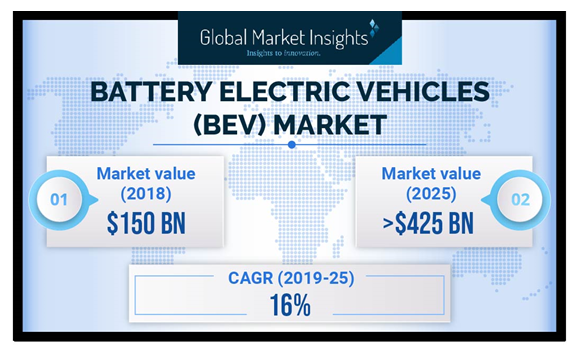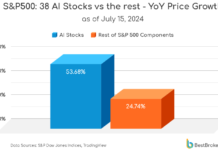
The Battery Electric Vehicle Market is set to grow from its current market value of more than $5 billion to over $425 billion by 2025; as reported in the latest study by Global Market Insights, Inc.(Source: Global Market Insights, Inc.) Growing prevalence of carbon emissions along with rising concerns to reduce dependency on fossil fuels is significantly contributing to the increasing demand for battery electric vehicles. Regulatory authorities are establishing guidelines for energy security and air quality improvement, offering a positive outlook for green mobility adoption across the globe. Rising disposable income along with the requirement for efficient personal mobility solutions are further escalating the market growth over the projected timeframe.

The uptake of battery electric vehicles is largely driven by supporting policy environment. Major economies across the globe are focusing on reducing the dependency on conventional fuels by phasing out diesel and gasoline engine vehicles. These policies are creating favorable environment for consumers to opt for battery electric vehicles. Industry participants are also launching multiple variants of electric vehicles to target a wide customer base, thereby providing a positive outlook for the industry expansion over the study timeframe.
Financial incentives offered by governments such as vehicle registration tax exemptions, free access to toll roads, tax credits, and free charging facilities are among the major factors accelerating the battery electric vehicles market share over the forecast timeframe. Moreover, easier diagnostics and repair facilities are enabling consumers to opt for such vehicles owing to convenient services. For instance, Tesla offers over-the-air (OTA) updates for its electric vehicles to diagnose problems and issues offering reliable and fast servicing solutions.
Improvements in battery technologies, higher driving range, and charging infrastructure are providing a significant boost to battery electric vehicles market expansion. Industry players are constantly investing in R&D to diversify and expand their product portfolio to target a wide customer base. Several economies are testing the feasibility of deploying electric buses for felicitating daily transportation to enhance efficiency and reduce greenhouse gas emissions.
Industry players are continuously investing in R&D for developing advanced battery solutions. For instance, in October 2017, Toshiba unveiled its advanced battery for electric vehicles that can enable around 320 km range coupled with ultra-fast charging technologies. Additionally, the advent of graphene and zebra solid-state batteries are further providing a positive outlook for the industry expansion over the forecast timeframe.
Improving vehicle engineering capabilities coupled with technological advancements in powertrain systems are propelling for the development of battery electric vehicles systems. The availability of simpler mechanical components, along with lower motor weight contribute significantly towards increasing the overall vehicle efficiency. Provision for charging alternatives at hospitality locations and workplaces will further assist in strengthening the battery electric vehicles market penetration.
The rising demand for electric heavy-duty trucks is attributed to the benefits offered including higher efficiency, lower maintenance costs, and the availability of superior power and torque. Industry players are engaged in developing advanced electric powertrain for improving the electric truck performance in diversified operating conditions. For instance, in 2018, Lightning Systems introduced an electric powertrain for powering heavy-duty trucks. The engines offer a driving range of up to 110 miles and generate over 295 horsepower.
North America battery electric vehicles will account for a considerable share on account of favourable government incentives and tax policies. Additionally, governments across the region are focusing on developing charging infrastructure to support the growing demand for such vehicles. For instance, the government in British Columbia offers discounts and rebates of up to USD 5,000 for battery electric vehicles under its Clean Energy Vehicles for British Columbia – Point of Sale Incentive Program.
Few of the key players in the battery electric vehicles market place include BYD company Ltd., BMW, Daimler AG, Volkswagen AG, Ford Motor Company, Toyota Motor Corporation, Nissan Motor Corporation, Hyundai Motor Company, and Tesla Inc. Industry participants are focusing on introducing a new range of battery electric vehicles for increasing their revenue generation. For instance, in December 2018, BMW introduced the Vision iNEXT fully electric concept car, incorporating new-generation electric drive trains for offering enhanced mobility experience to its customers.

















